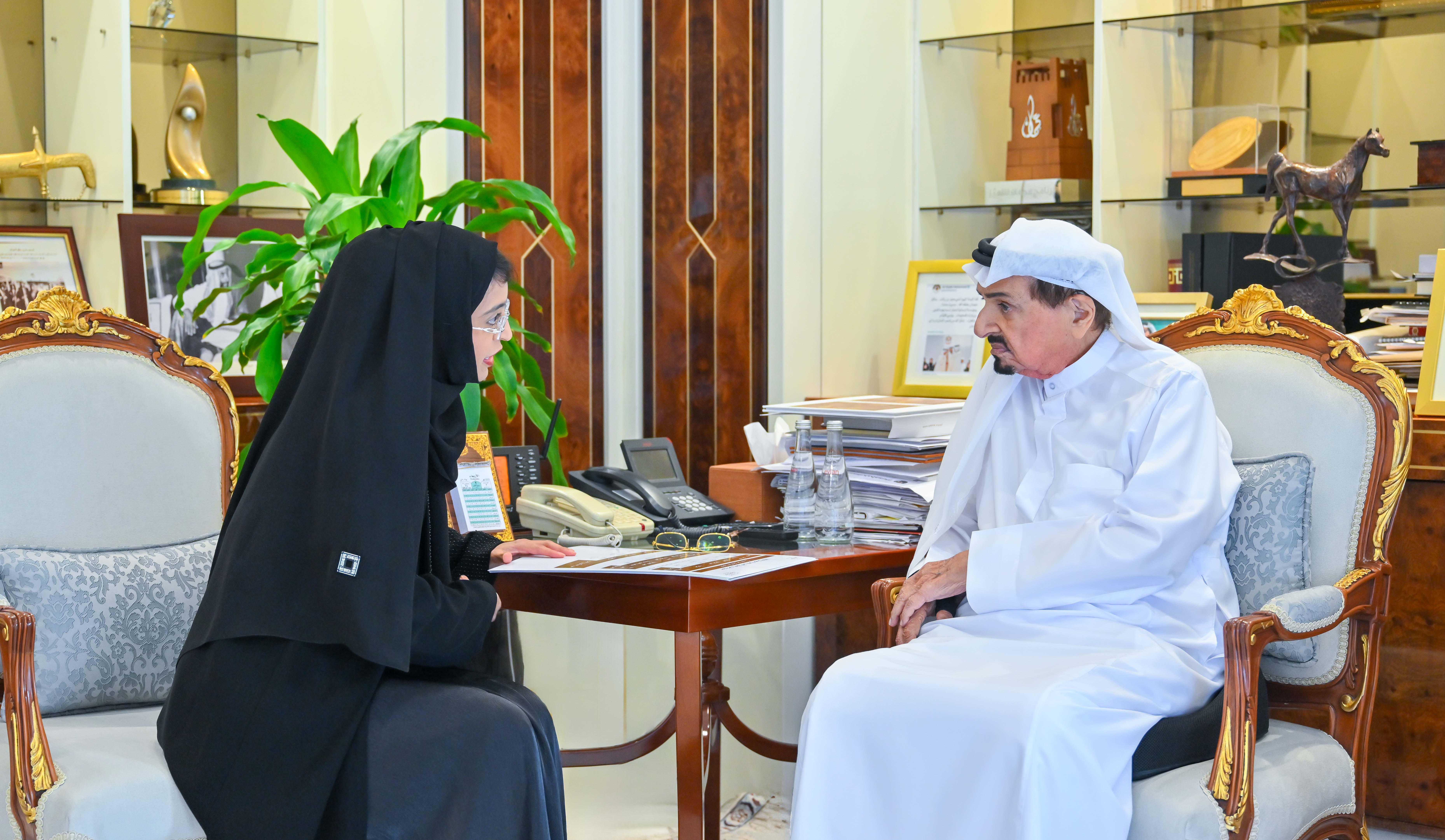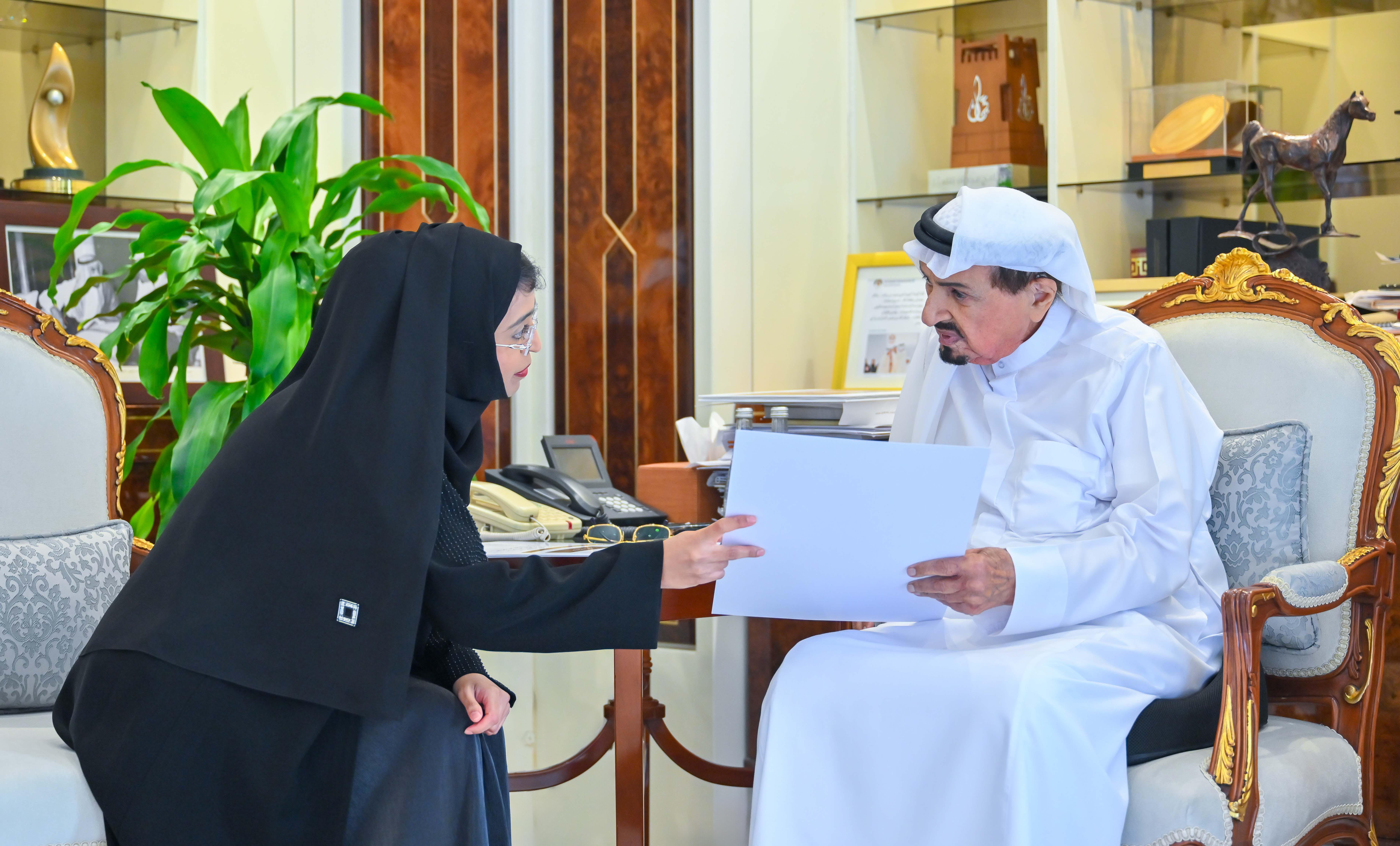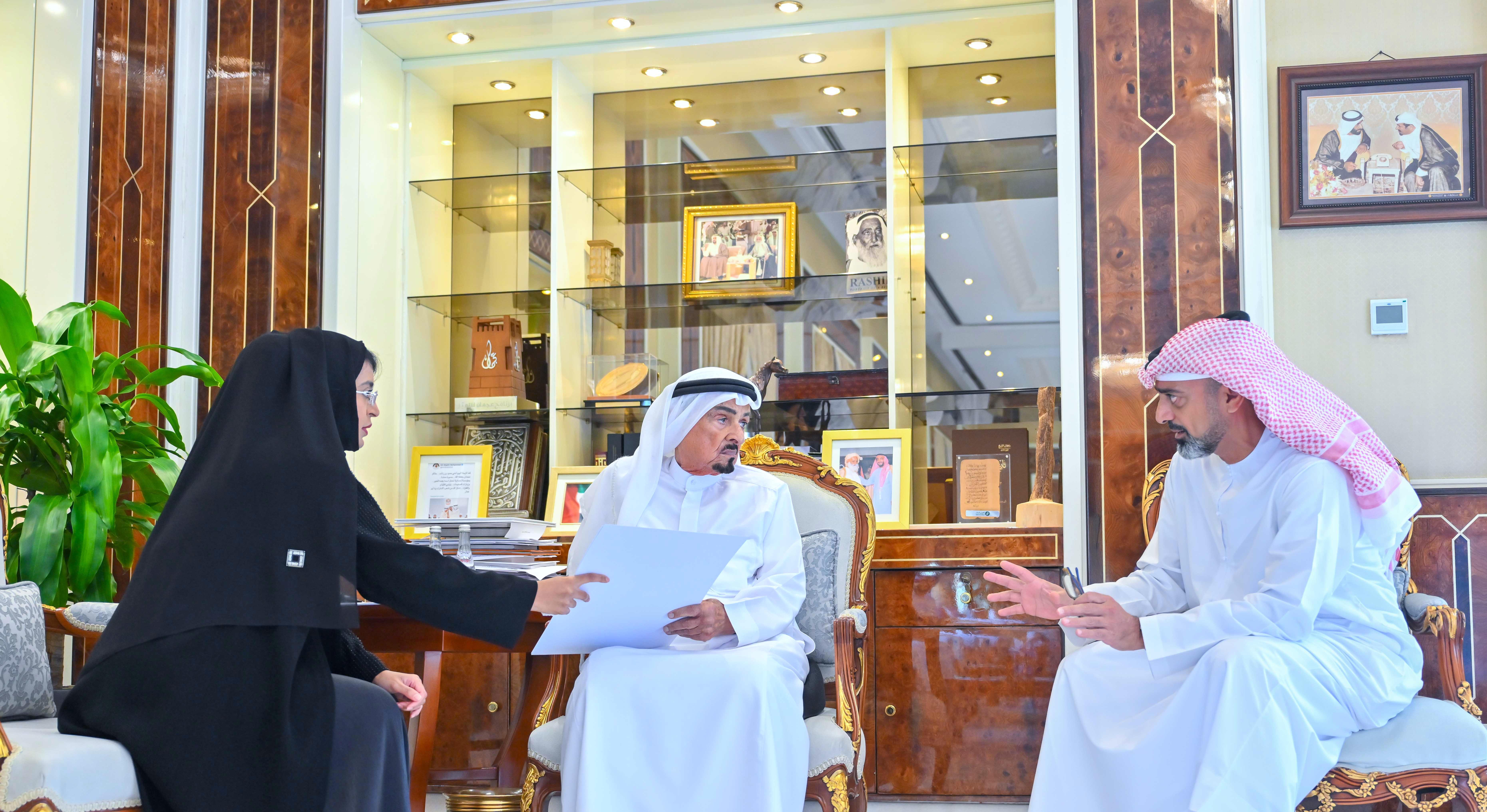Humaid bin Rashid reviews results of Household Income & Expenditure Survey in Ajman
|
General News
H.H. Sheikh Humaid bin Rashid Al Nuaimi, Supreme Council Member and Ruler of Ajman, in the presence of H.H. Sheikh Ammar bin Humaid Al Nuaimi, Crown Prince of Ajman and Chairman of the Executive Council, reviewed the results of the Household Income and Expenditure Survey in Ajman for 2024 and the first half of 2025, through a detailed presentation prepared by the Ajman Statistics Centre.
H.H. Sheikh Humaid bin Rashid Al Nuaimi affirmed that the survey results are a pivotal tool for understanding the living, social, and economic reality, and represent an essential foundation for developing developmental plans that enhance quality of life and support the path of sustainable development in the emirate.
The Ruler of Ajman praised the efforts of the Ajman Statistics Centre in preparing studies and surveys that provide comprehensive data reflecting various social and economic aspects of the emirate, in a way that contributes to the development of services, ensures that citizens’ needs are met, and raises their standard of living.
The survey aims to provide accurate data on income and consumption patterns in the emirate, enabling policymakers to design balanced development policies and strengthen initiatives to improve the living standards and quality of life of families in Ajman in the coming years.
H.H. the Ruler of Ajman also listened to a detailed explanation of the survey results presented by Dr. Hajar Al Habishi, Director- General of the Ajman Statistics Centre. The presentation included comprehensive analyses of quality of life, social and economic well-being in the emirate, and details of spending on education and health sectors, in addition to identifying families’ self-sufficiency thresholds, consumption patterns, and living habits in Ajman.
The presentation further included in-depth results on the demographic characteristics of families in the emirate, living standards, income sources, daily living costs, as well as the classification of families by different categories. It also highlighted the needs of some special cases among Emirati families, and presented practical proposals to strengthen a culture of saving and promote financial investment.
The survey concluded with a set of recommendations focusing on enhancing social support networks, primarily by empowering low-income families and ensuring they receive their basic needs. The recommendations also emphasized encouraging Emirati families to launch private economic projects by providing incentives and financing programs that support their active participation in the labor market.
On a related note, H.H. Sheikh Humaid bin Rashid also reviewed the Marriage and Divorce Report for 2024 and the first half of 2025, which showed a significant increase in the number of marriage contracts alongside a decline in divorce rates — a positive indicator of the stability of family and community fabric in the emirate.
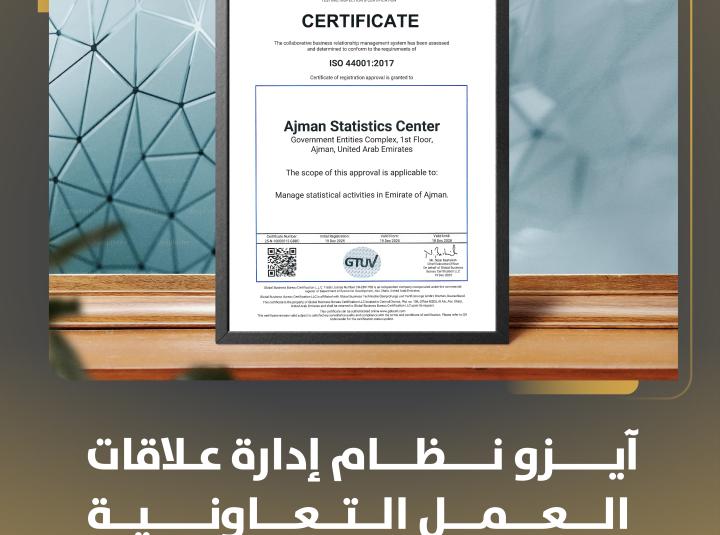
Ajman Statistics Center Receives ISO 44001:2017 Certification for Collaborative Business Relationship Management System
حصد مركز عجمان للإحصاء شهادة ISO 44001:2017 لنظام إدارة علاقات العمل التعاونية، في خطوة تعكس التزام المركز بتطبيق أفضل الممارسات الدولية لتعزيز جودة خدماته المؤسسية وتطوير علاقات الشراكة مع الجهات الحكومية والقطاع الخاص والمجتمع على المستويين المحلي والدولي. ويأتي هذا الإنجاز بعد اجتياز المركز أعمال التدقيق والتحقق من التزامه الكامل بتطبيق الإجراءات والعمليات المعتمدة، ودراسة الوثائق ومطابقتها لمتطلبات المواصفة وفق المعايير الدولية، بما يضمن فعالية وكفاءة إدارة الشراكات المؤسسية. وأكدت سعادة الدكتورة هاجر الحبيشي، المدير العام لمركز عجمان للإحصاء “أن الحصول على شهادة ISO 44001:2017 يجسد التزام المركز بتطبيق المعايير العالمية، ويعكس حرصه على تطوير منظومة العمل الإحصائي وفق أفضل الممارسات. مشيرةً إلى أن هذه الشهادة تسهم في تنظيم ورفع كفاءه إدارة الشراكات، ودعم متخذي القرار، وتعزيز التعاون مع جميع الشركاء بما يحقق أثرًا إيجابيًا ينعكس على مسيرة التنمية المستدامة في إمارة عجمان. وأضافت الدكتورة هاجر أن هذا الإنجاز يُمثل استكمالًا لمسيرة التميز المؤسسي للمركز، ويعكس جهوده المستمرة في بناء شراكات وعلاقات تعاونية متينة ومثمرة مع مختلف الجهات، وفتح آفاق التنسيق والتكامل لتعظيم أثر العمل المشترك، بما يخدم أهداف المركز ويُسهم في إسعاد المتعاملين. وتجسد هذه الشهادة خطوة مهمة في مسيرة التميز المؤسسي لمركز عجمان للإحصاء، مؤكدة التزامه المستمر بالابتكار، واستدامة الشراكات، ورفع كفاءة الأداء المؤسسي بما ينعكس إيجابيا على جودة الخدمات الحكومية ومكانة إمارة عجمان على الصعيد المؤسسي والاجتماعي والاقتصادي. وفي ذات السياق، أكد فريق مركز عجمان للإحصاء أن اعتماد هذه الشهادة يعزز القدرة على متابعة وتقييم أداء العلاقات التشاركية، ويتيح للمركز تحديد الاحتياجات التنظيمية بدقة، وتسريع عمليات التطوير لمنظومة العمل المشترك. وفي إطار جهود المركز المستمرة لتطوير منظومة الحوكمة المؤسسية وتعزيز جودة الأداء تم تجديد شهادة نظام المرونة المؤسسية 22316:2017ISO، بالإضافة إلى تجديد شهادة نظام إدارة المخاطر2018: ISO 31000، بما يسهم في تعزيز القدرة على التوقع والاستجابة والتكيف مع المتغيرات والأزمات، ورفع كفاءة العمليات التشغيلية.
Read more ➤➤➤
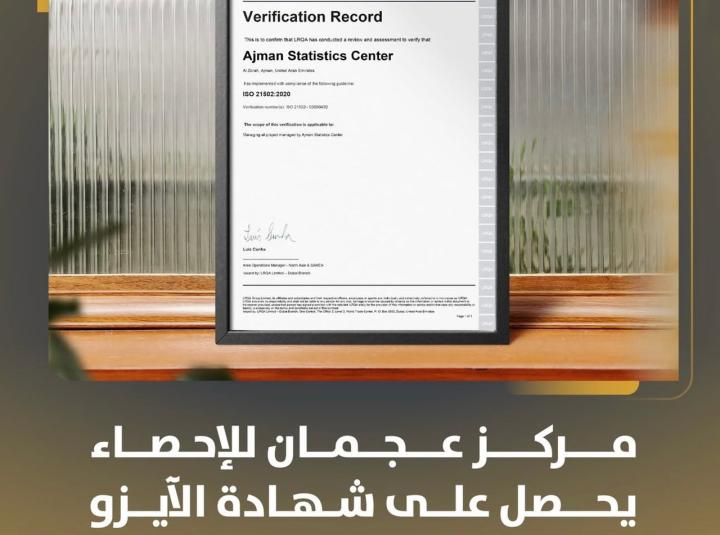
Ajman Statistics Center Obtains ISO 21502 Certification in Project Management
Ajman Statistics Center has obtained ISO 21502 certification for Project Management in the Strategy and Institutional Performance Department, as part of its ongoing efforts to adopt international best practices and enhance the efficiency and effectiveness of institutional project management. ISO 21502 is an international guidance standard that provides a comprehensive framework for project management across all phases, from planning through to closure, with a strong focus on achieving objectives and delivering added value with high efficiency. The standard encompasses a range of core principles and practices, including governance, stakeholder management, scope definition, time and cost management, quality, risk management, communication, and resource management. The Center’s attainment of this certification underscores its commitment to standardizing project management methodologies, improving the quality of decision-making, increasing project success rates, and ensuring alignment with strategic objectives. This, in turn, contributes to enhancing institutional performance and achieving sustainable institutional excellence.
Read more ➤➤➤
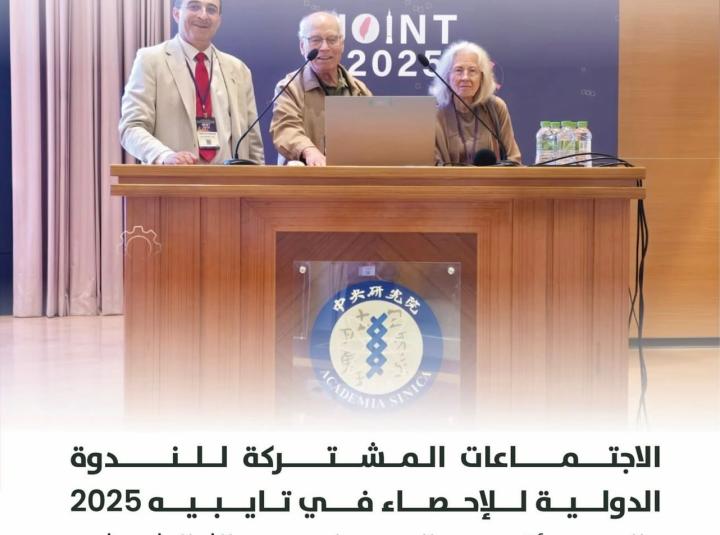
Joint Meetings of the International Statistical Seminar in Taipei 2025
Under the theme “New Horizons: Statistics in a Changing World,” the Taipei Joint 2025 Conference on Statistics and Data Science was organized in partnership between the Institute of Statistical Science, Academia Sinica (ISSAS), and the International Chinese Statistical Association (ICSA), in collaboration with the Chinese Institute of Probability and Statistics. The conference was held in the city of Taipei in December 2025, bringing together the 13th International Conference of the Chinese American Statistical Association and the International Statistical Seminar in Taipei. The conference was attended by a delegation from Ajman Statistics Center, reflecting the Center’s commitment to keeping abreast of the latest global practices and trends in statistics, quantitative analysis, and data science, as well as to strengthening channels of communication and knowledge exchange with international academic and statistical institutions. The conference served as an advanced scientific platform for discussion and partnership-building, with the participation of a distinguished group of academics, researchers, experts, and decision-makers from around the world, contributing to the advancement of statistical work and the enhancement of data quality in support of informed decision-making.
Read more ➤➤➤
